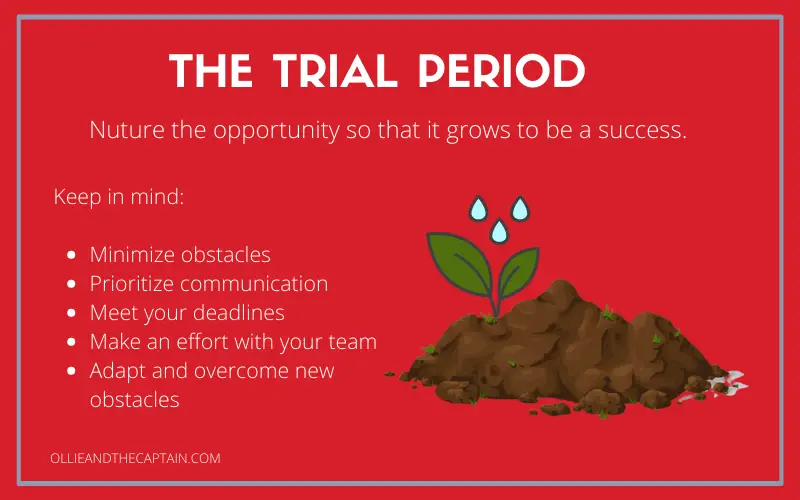When we first started talking about working remotely and traveling the world, we could see the end product but had no idea how to get there. We had to start putting together practical steps to help us transition from office life, to Bali life. Or Brazilian life, Portuguese life, or whatever life you really want.
Converting your existing job to be nomadic is a work in progress and there are several ways to achieve the goal.
Read about the three approaches to transition from the office to working remotely.
Although each instance will be different, we’ve grouped the process into three main steps.
- Conversation
- Trial run
- Verdict
Depending on the verdict, you’ll either choose to continue the trajectory of your trial run or quit your job and branch out on your own. Ollie and I both went through these steps and came to different verdicts. Ollie ended up following the soft approach, while I ended up pursuing the hard approach. It’s important to keep an open mind about where you may end up.
Read about working and living in Cape Town here.
* Just to let you know that this article may contain affiliate links. If you click on them we might receive a small commission, at no extra cost to you.
Contents
1. The Conversation
Depending on your employer, the conversation of working remotely may manifest differently. With COVID making remote work a viable option, this may be easier than when we initially had the conversation.
You’ll have to use your discretion and experience with your employer to know what tone to use, how to best communicate, and whether or not you need a build-up. For example, some people may find that meeting up for a beer after work breaks the ice. Others will need to book a formal meeting to initiate the chat.
Regardless of which option works best for you, there are a few basic steps to take that will benefit the conversation across the board.
Be Respectful
Adopt a respectful tone and don’t come across as entitled. You may think that working remotely will be painless and easy, but your employer may need some convincing. They’ve structured their business in a certain way and have streamlined communications according to their vision.
Coming in hot will only get their back up and you’ll lose the opportunity before you even present the benefits.
Remember That It’s Their Business
In line with respecting your employer in the conversation, it’s important to remember that it’s their business and not your own. At the end of the day, they have the final say and you have to be at peace knowing that you’ve done what you can without holding any resentment if they disagree to roll with it.
In addition, they may have certain prerequisites in making the remote work option effective. This may include time zones, online availability, regular check-ins, and spending a certain amount of time of the year within close proximity.
Be Prepared For A Difficult Discussion
If you’re lucky, your employer may agree on the spot and not need much convincing. However, chances are that you may need to answer a few tricky questions to work remotely. When preparing for the conversation, put yourself in your employer’s position and think about questions that they may ask.
For example, jot down the benefits of working remotely for both yourself and the company. Your employer will want to know what they are in advance. Consider any challenges that you may encounter while working remotely – and have a solution on the ready.
Discuss Logistics
Whether or not your employer asks for the logistics of how the trial run (or remote working experience) will unfold, you should bring them up.
The following details should be discussed as a starting point;
- Location – is it independent of time zones or are there restrictions?
- Time zones – if your time zones are not the same, what’s the overlap expected to be?
- Trial run – if you are doing a trial run, how long will it be?
- Book a debrief – for when the trial run is finished to discuss what worked and what didn’t
- Company assets – if you use a company laptop, will you be allowed to travel with it? Will this affect insurance?
- Returning to the office – will you be required to return to the office at certain points in time?
Use Nomad Travel Tools to compare the logistics of two destinations.
Follow Up With An Email
Breathe out. You’ve done the hard bit and broken the ice. Or planted the seed at least.
Before you skip home and look at ticket prices, you need to make sure that you follow up with a detailed email that outlines all that you’ve discussed. No matter how lovely your boss is, you need to get everything in writing.
Read about working and living in Seoul here.
2. The Trial Run
They say that the proof is in the pudding, and it’s true. Your mind can be filled with the grandest dreams of living the remote work life but fail to pull it off. No matter how confident you are in your ability to work in your own space, it’s important to do a trial run.
We went to Portugal and worked in Lisbon for a month. The destination was chosen for two main reasons – the time zones lined up with South Africa (sort of) and we found the culture alluring.
Read more about Portugal’s island for remote workers here.

Try to minimize obstacles when organizing your trial period. These challenges would have been identified in your initial discussion and will differ from one company to the next. For example, your trial period may be that you work from home four days a week. It could be that you work from another city for a week of every month. If you’re lucky, it could mean traveling to the other side of the globe.
It’s essential to remember the purpose of the trial period which is to prove your ability to work remotely. Make sure that you prioritize communication, get your work done on deadline, and make an effort to connect with your team outside of work (depending on the company culture).
Be aware that there may be challenges that you didn’t expect. This will be a test of your ability to adapt. By the end of the trial period, you’ll have a good idea of whether the remote work life is for you or not. Be open-minded in the process.
Read about working and living in Buenos Aires here.
3. Leverage the Verdict
Once you’ve had the discussion with your employer and completed the trial run, it’s super important to debrief. If you’re anything like us, you’ll be itching to get back on the road, but your employer may have other ideas.
The debrief will make sure that you address any niggles that came up and that during the trial. You can also chat about what worked well and may discover that the business streamlined in many ways, adapting to a global working lifestyle.
If you decide to continue your pursuit of the dream, then you’ll have two options. The first is to get the thumbs up from your employer and work out a long-term plan. The other is to branch out on your own if your employer found the trial run to be more effort than it was worth.
Branching Out On Your Own
Don’t be disheartened if your employer decides that they need their team close. Remember that it is their business and they have a goal that they want to achieve. Be grateful for the opportunity that they gave you and the trust that they placed in you for the trial run.
Unfortunately, this does lead to a difficult decision. Will you give up the dream of working remotely for the security of the job? Or will you take a leap of faith and reach out to find remote work.
This brings us back to the soft, medium, and hard approach to going remote. You can either put in your resignation, work out your notice and make sure that you have a backup plan (this is the hard approach).
When going this route, we strongly advise that you have something lined up first. The job market can be slim pickings and if you have a job in the first place – count yourself lucky. Whether you plan to work on a freelance basis or start up your own business, you need to make sure that you cover your bases.
Another option involves the medium approach. In this instance, you resign from your current employer but propose that you work on a freelance basis if they are open to his option. If parts of your job can be done remotely then this could be a viable option.
Tips To Keep It Working
If you’re one of the lucky ones that breezes through the process and the debrief is a positive one, then you’ve got increased responsibility. Now, you have to make sure that you keep the productivity high and don’t drop the ball.
If your trial period was local, then you may want to branch out a little bit further. The next few weeks or months will have a big impact on how that unfolds.
There are a few tips to keep in mind to make sure that you keep your employer happy while working and traveling.
- Make regular communication a priority
- Try to overlap with the team’s “golden hour” when everyone is online and most productive
- Make an effort to chat about non-work related topics to keep the moral
- Draw boundaries for when you need to put your head down and work – you’re going to need this in order to meet deadlines
- Set up a dedicated workspace
- Keep an eye on internet connection and pick your destinations wisely
- Set office hours and stick to them
- Have a shutdown ritual to get you out of the zone
- Keep an eye open for weaknesses and opportunities to improve
Read about working and living in Bali here.
Time to Begin Working Remotely
Contrary to many self-help books that are filled with empty promises, setting yourself up to working remotely requires discipline and a plan. Each business is unique and has a different set of demands.
If you keep the fundamentals a priority, then you’ll be able to transition with your best foot forward.
We’ll be sharing more information and tips on the topic over the next while, but if you want to jump ahead in a summarized fashion then you can read our blog on four steps to prepare to be a digital nomad.
Generated with Pin Generator




